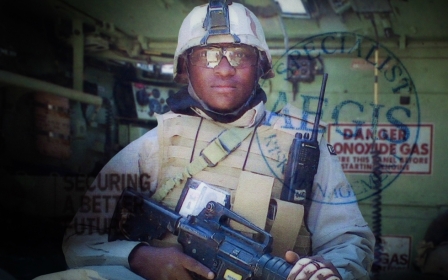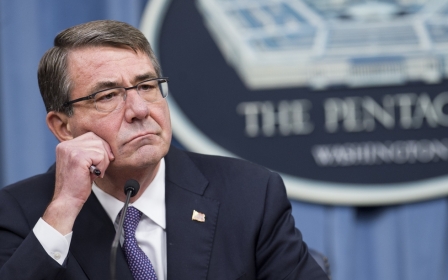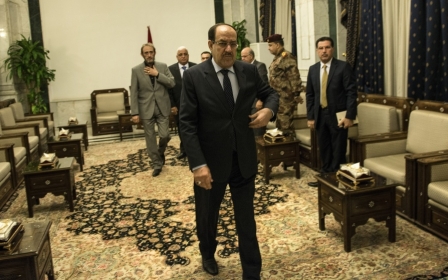US sending extra troops to Iraq to support fight against IS

The United States will deploy additional forces to Iraq and make Apache attack helicopters available to support the country's troops, US Secretary of Defence Ashton Carter said Monday in Baghdad.
"We are going to bring in additional forces," Carter said, adding that the Apaches would support Iraqi efforts to surround and eventually recapture Mosul from the Islamic State (IS) group.
A senior US defence official said about 200 additional American military personnel would be deployed, pushing the total figure past 4,000.
The United States heads an international coalition that is carrying out strikes against IS in both Iraq and Syria and also providing training and other assistance to forces fighting IS.
It has been bombing IS since August 2014, but most of the strikes have been carried out by planes or drones.
Carter's visit to the country comes after a week of political turmoil that has been a setback for Prime Minister Haider al-Abadi, and the US defence chief has said it is important to support the embattled premier.
On Monday, Carter met officials including Abadi and defence minister Khaled al-Obeidi to discuss increasing American military assistance to Iraq ahead of the anticipated battle for Mosul.
Iraqi forces have begun preparatory operations in Nineveh province, of which Mosul is the capital, but the actual assault to take the city is not expected to take place for months, and possibly not until next year.
"We are going to need to be more aggressive," the official said.
Carter arrived in Baghdad from the United Arab Emirates, the first stop on a Gulf tour during which he will seek to shore up support for Iraq.
He has said that "the success of the campaign against (IS) in Iraq does depend upon political and economic progress as well," and that "it's important that we continue to support" Abadi.
The premier has sought to replace the current cabinet of party-affiliated ministers with a government of so-called technocrats, but has faced major opposition from powerful parties that rely on control of ministries for patronage and funds.
Abadi's cabinet efforts were overshadowed by multiple days of chaos at parliament, during which parliamentarians held a sit-in, brawled in the parliament hall and sought to sack the speaker.
Boots on the ground
In addition to major security and political challenges, Iraq also faces a serious economic crisis caused by low oil prices and years of mismanagement and corruption by officials.
The United States has deployed some 3,900 troops to Iraq, most of them in advisory and support roles.
But Washington has also sent special forces to carry out raids against IS, and US Marines have deployed to provide artillery support to Iraqi troops.
US President Barack Obama repeatedly pledged that there would be no "boots on the ground" to combat IS, but at least two American military personnel have already been killed.
Last month, a Marine was killed in a rocket attack in northern Iraq last month, and a US special forces soldier was wounded during a raid last year and later died.
Carter's trip to Iraq is the latest in a series of visits by senior Western officials in recent days.
US Secretary of State John Kerry travelled to Iraq two weeks ago to show support for the crisis-hit government, vowing to turn up the heat on IS.
And French Defence Minister Jean-Yves Le Drian came to Iraq last week, saying that Mosul and Raqqa, IS's main stronghold in Syria, "must fall" this year.
Analysts have warned that continuing political instability could undermine the united front against IS in Iraq and increase Iranian influence in the country.
"In the most dangerous scenario, the Iraqi government could collapse and set off a chain of events that leads to the selection of a pro-Iranian prime minister," wrote Patrick Martin for the Institute for the Study of War. "This course of action would undermine the progress of the anti-ISIS campaign, as Iran’s strategic interest remains expelling US forces from the country."
"Meanwhile, the instability resulting from the political crisis could lead ISIS to expand its capabilities in Iraq and launch a wave of attacks aimed at further destabilising the country."
New MEE newsletter: Jerusalem Dispatch
Sign up to get the latest insights and analysis on Israel-Palestine, alongside Turkey Unpacked and other MEE newsletters
Middle East Eye delivers independent and unrivalled coverage and analysis of the Middle East, North Africa and beyond. To learn more about republishing this content and the associated fees, please fill out this form. More about MEE can be found here.




